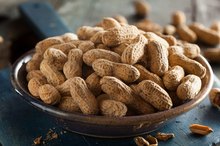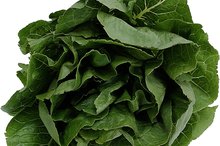The Nutritional Value of Turkish Apricots
Apricots offer a succulent, sweet flesh with many vitamins and minerals, but the fruit is quite perishable. As a result, Americans often find Turkish apricots in dried form only. The nutritional values of American and Turkish apricots differ significantly -- the Turkish fruit has more calcium but less beta carotene and is also lighter in color.
Calories and Fat
Turkish apricots make a good snack, as they are relatively low in calories and fat. A 1.4 oz. serving of dried Turkish apricots contains 120 calories. If you follow a 2,000-calorie diet, the amount of calories in this dried fruit accounts for 6 percent of your daily allowance. This food contains no fat, making it a smart option for reduced-fat diets.
Carbohydrates and Fiber
Pepperoncini Nutrition
Learn More
A 1.4 oz. serving of Turkish apricots introduces 29 g of carbohydrates into your diet. Up to 65 percent of your daily calories should come from carbohydrates to satisfy your daily energy requirements. You also get 4 g of fiber, a considerable portion of the 22 to 28 g of fiber you need if you are a woman or 28 to 34 g of fiber needed in a man's daily diet.
Iron
Eat a serving of Turkish apricots, and you get 6 percent of the daily recommended intake of iron if you follow a 2,000-calorie diet. The iron available in this dried fruit helps regulate cell growth and contributes to the production of hemoglobin in your blood. Include 8 to 11 mg of iron in your diet each day to avoid anemia, a condition that make you tired, pale and shaky.
Calcium
Shelled Peanuts: Nutrition Facts
Learn More
Turkish apricots contain calcium, a mineral useful for your bones. One serving provides you with 4 percent of the calcium you require each day. In addition to calcium's influence on bone strength, it also contributes to muscle, nerve and heart function. The National Institutes of Health indicates that most Americans consume less calcium than they need, so including Turkish apricots in your diet is a tasty solution.
Vitamins
You get both vitamins A and C in your diet when you consume Turkish apricots -- each serving provides 2 percent of the suggested daily intake of these nutrients. The vitamin A in these apricots provides benefits for your eyes, warding off dry eyes and macular degeneration. Vitamin C helps your body make collagen, a compound that makes your skin elastic.
Related Articles
References
Resources
Writer Bio
Nicki Wolf has been writing health and human interest articles since 1986. Her work has been published at various cooking and nutrition websites. Wolf has an extensive background in medical/nutrition writing and online content development in the nonprofit arena. She graduated with a Bachelor of Arts in English from Temple University.









